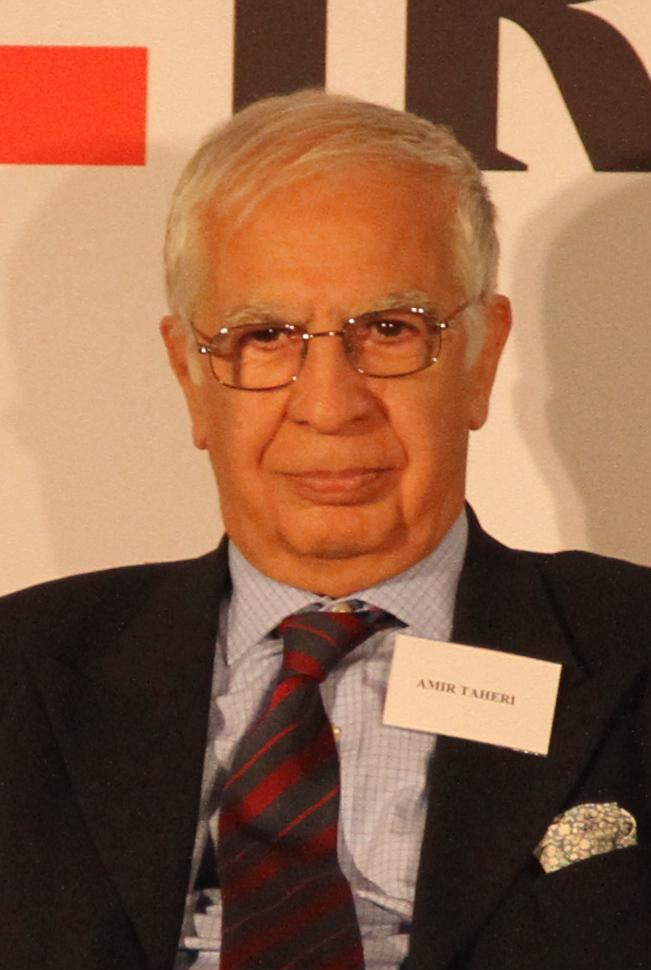Putin is turning the Syrian coast into another Crimea http://nypost.com/2015/09/19/putin-is-turning-the-syrian-coast-into-another-crimea/, New York Post (September 19, 2015).
New York Post
Amir Taheri: Zitate auf Englisch
"Myths of our Afghanistan debate" http://nypost.com/2009/10/15/myths-of-our-afghanistan-debate/, New York Post (October 15, 2009).
New York Post
Holy Terror: The inside story of Islamic terrorism (1987)
"Brussels is what happens when liberals don’t push immigrants to integrate" http://nypost.com/2016/03/27/brussels-is-what-happens-when-liberals-dont-push-immigrants-to-integrate/ New York Post (March 27, 2016).
New York Post
"The lonely dictator" http://nypost.com/2011/08/12/the-lonely-dictator/, New York Post (August 12, 2011).
New York Post
The only form of government in “Pure Mohammadan Islam” is the caliphate; the only law is sharia.
"The ugly attractions of ISIS’ ideology" http://nypost.com/2014/11/02/the-ugly-attractions-of-isis-ideology/, New York Post (November 2, 2014).
New York Post
"Myths of our Afghanistan debate" http://nypost.com/2009/10/15/myths-of-our-afghanistan-debate/, New York Post (October 15, 2009).
New York Post
The Unknown Life of the Shah (1991)
Holy Terror: The inside story of Islamic terrorism (1987)
Obama’s elementary errors on Islam http://nypost.com/2015/02/20/obamas-elementary-errors-on-islam/, New York Post (February 20, 2015).
New York Post
Putin is turning the Syrian coast into another Crimea http://nypost.com/2015/09/19/putin-is-turning-the-syrian-coast-into-another-crimea/, New York Post (September 19, 2015).
New York Post
"The loneliest man in Syria" http://nypost.com/2011/05/10/the-loneliest-man-in-syria/, New York Post (May 10, 2011).
New York Post
Battle of Tikrit’s lessons for Obama http://nypost.com/2015/03/29/battle-of-tikrits-lessons-for-obama/, New York Post (March 29, 2015).
New York Post
"A cry from France: After Nice, can we finally face the truth about this war?" http://nypost.com/2016/07/15/a-cry-from-france-after-nice-can-we-finally-face-the-truth-about-this-war/ New York Post (July 15, 2016)
New York Post
The Ayatollah's Plan for Israel and Palestine http://www.gatestoneinstitute.org/6263/khamenei-israel-palestine, Gatestone Institute (July 31, 2015)
"Myths of our Afghanistan debate" http://nypost.com/2009/10/15/myths-of-our-afghanistan-debate/, New York Post (October 15, 2009).
New York Post
Opinion: The Syrian Orphan and a Club of Cynics http://english.aawsat.com/2015/09/article55345155/opinion-the-syrian-orphan-and-a-club-of-cynics, Ashraq Al-Awsat (18 Sep, 2015).
"A cry from France: After Nice, can we finally face the truth about this war?" http://nypost.com/2016/07/15/a-cry-from-france-after-nice-can-we-finally-face-the-truth-about-this-war/ New York Post (July 15, 2016)
New York Post
"Myths of our Afghanistan debate" http://nypost.com/2009/10/15/myths-of-our-afghanistan-debate/, New York Post (October 15, 2009).
New York Post
"The mad dream of a dead empire that unites Islamic rebels" http://nypost.com/2014/06/14/the-mad-dream-of-a-dead-empire-that-unites-islamic-rebels/, New York Post (June 14, 2014).
New York Post
"Citizen Musharraf" http://nypost.com/2007/11/29/citizen-musharraf/, New York Post (November 29, 2007).
New York Post
We’re letting Iran and ISIS carve up Iraq http://nypost.com/2015/03/15/were-letting-iran-and-isis-carve-up-iraq/, New York Post (March 15, 2015).
New York Post
"Opinion: Iran must confront its past to move forwards" http://www.aawsat.net/2015/02/article55341173, Ashraq Al-Awsat (February 6, 2015).
Holy Terror: The inside story of Islamic terrorism (1987)
"Musharraf's coup: What to do" http://nypost.com/2007/11/07/musharrafs-coup-what-to-do/, New York Post (November 7, 2007).
New York Post
"Myths of our Afghanistan debate" http://nypost.com/2009/10/15/myths-of-our-afghanistan-debate/, New York Post (October 15, 2009).
New York Post
"The not-so-Islamic State: ISIS’ huge debt to the infidel" http://nypost.com/2014/11/20/the-not-so-islamic-state-isis-huge-debt-to-the-infidel/, New York Post (November 20, 2014).
New York Post
The Unknown Life of the Shah (1991)
Stop giving modern Islam a free pass http://nypost.com/2015/01/09/stop-giving-modern-islam-a-free-pass/, New York Post (January 9, 2015).
New York Post
Iran after Khamenei: the Debate Starts http://english.aawsat.com/2017/03/article55369052/iran-khamenei-debate-starts, Ashraq Al-Awsat (March 10, 2017)
